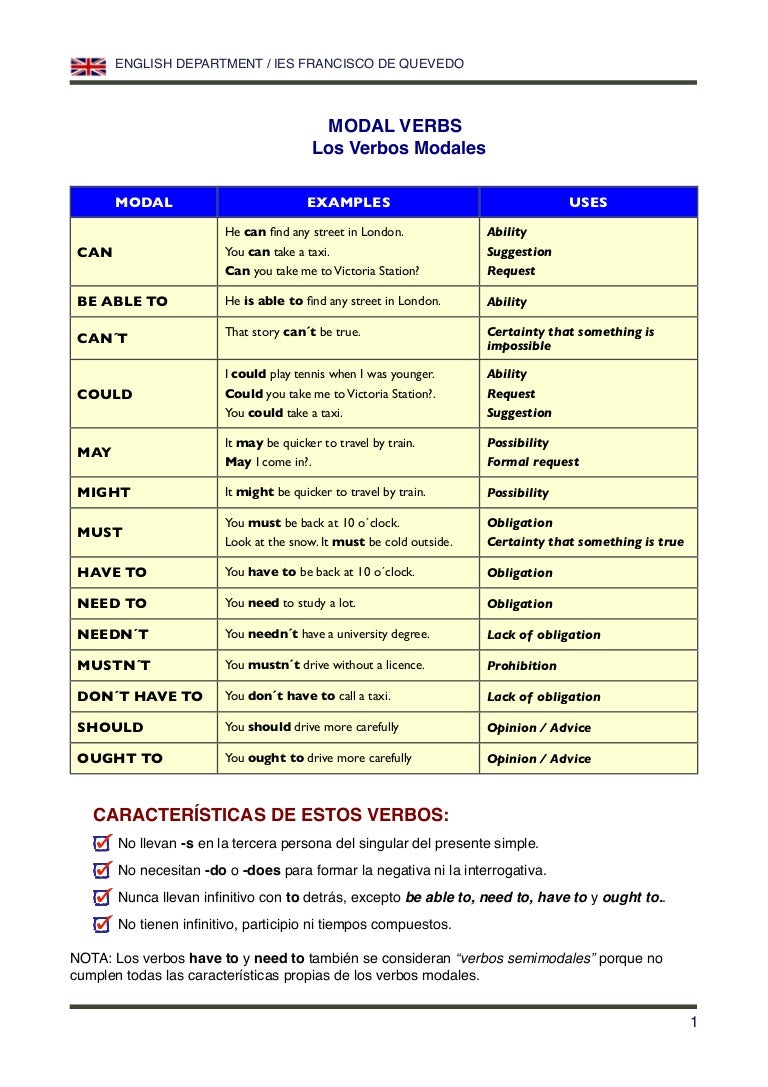What Is Modal Verbs - All Modal Helping Verbs in English Grammar I एक वीडियो में ... : Is ought to a modal verb?. What is the definition of modal auxiliary verbs? A modal is a type of auxiliary (helping) verb that is used to express: Modal verbs the modal verbs include can, must, may, might, will, would, should. Modal verbs are always paired with at least one other verb. What are the modes of verbs?
Do modal auxiliary verbs have tense? In english, the modal verbs commonly used are can, could, may, might, shall, should, will, would, and must. Is ought to a modal verb? Modal verbs the modal verbs include can, must, may, might, will, would, should. Below is a list showing the most useful modals and their most common meanings:

A modal is a special verb used before a main verb to express ability, obligation, possibility, promise, advice, suggestion, and so on.
Ability, possibility, permission or obligation. Do modal auxiliary verbs have tense? Modal verbs the modal verbs include can, must, may, might, will, would, should. A modal is a type of auxiliary (helping) verb that is used to express: What is the definition of modal auxiliary verbs? Below is a list showing the most useful modals and their most common meanings: A modal is a special verb used before a main verb to express ability, obligation, possibility, promise, advice, suggestion, and so on. We use modal verbs to talk about our opinion or attitude about something. Modal verbs always accompany the base (infinitive) form of another verb having semantic content. In english, the modal verbs commonly used are can, could, may, might, shall, should, will, would, and must. Modal verbs are very different from normal verbs. A modal verb, or a modal auxiliary verb, is "any of the group of english auxiliary verbs, including can, could, may, might, shall, should, will, would, and must, that are used with the base form of another verb to express distinctions of mood." modal verbs are a type of auxiliary verb (helping verb). Likelihood, ability, permission, request, capacity, suggestions, order, obligation, or advice.
Is ought to a modal verb? A modal verb is a helping (auxiliary) verb that expresses ability, possibility, permission, or obligation. Modal verbs always accompany the base (infinitive) form of another verb having semantic content. In english, the modal verbs commonly used are can, could, may, might, shall, should, will, would, and must. Modal verbs the modal verbs include can, must, may, might, will, would, should.

Is ought to a modal verb?
The modal verb must be used in a verb phrase. Do modal auxiliary verbs have tense? Is ought to a modal verb? Modal verbs the modal verbs include can, must, may, might, will, would, should. What is the definition of modal auxiliary verbs? A verb phrase is more than one verb used in together to express an action. A modal is a special verb used before a main verb to express ability, obligation, possibility, promise, advice, suggestion, and so on. Modal verbs always accompany the base (infinitive) form of another verb having semantic content. Below is a list showing the most useful modals and their most common meanings: In english, the modal verbs commonly used are can, could, may, might, shall, should, will, would, and must. A modal verb is a helping (auxiliary) verb that expresses ability, possibility, permission, or obligation. What are the modes of verbs? They are used with other verbs to express ability, obligation, possibility, and so on.
Is ought to a modal verb? A modal verb, or a modal auxiliary verb, is "any of the group of english auxiliary verbs, including can, could, may, might, shall, should, will, would, and must, that are used with the base form of another verb to express distinctions of mood." modal verbs are a type of auxiliary verb (helping verb). What are the modes of verbs? In english, the modal verbs commonly used are can, could, may, might, shall, should, will, would, and must. Modal verbs are very different from normal verbs.
Modal verbs are always paired with at least one other verb.
A modal verb, or a modal auxiliary verb, is "any of the group of english auxiliary verbs, including can, could, may, might, shall, should, will, would, and must, that are used with the base form of another verb to express distinctions of mood." modal verbs are a type of auxiliary verb (helping verb). Likelihood, ability, permission, request, capacity, suggestions, order, obligation, or advice. They are used with other verbs to express ability, obligation, possibility, and so on. What are the modes of verbs? Do modal auxiliary verbs have tense? A modal is a type of auxiliary (helping) verb that is used to express: We use modal verbs to talk about our opinion or attitude about something. What is the definition of modal auxiliary verbs? The modal verb must be used in a verb phrase. Modal verbs the modal verbs include can, must, may, might, will, would, should. Ability, possibility, permission or obligation. A modal is a special verb used before a main verb to express ability, obligation, possibility, promise, advice, suggestion, and so on. Is ought to a modal verb?

Posting Komentar
0 Komentar